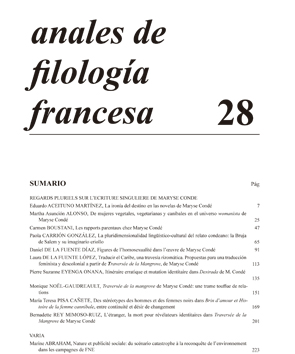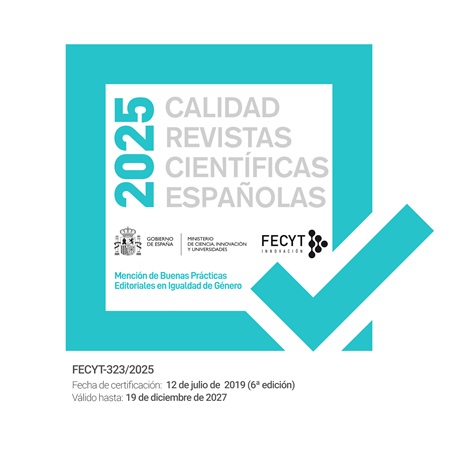Erratic itinerary and identity mutation in M. Condé’s Desirada
Supporting Agencies
- Université de Yaoundé I
Abstract
How does the phenomenon of immigration cause migrants to change their psychological, socio-professional and cultural identities to such an extent that they become hybrids? Based on Henri Mitterand’s sociocriticism, this study is organized in three parts. First, we show how immigration proves to be a stumbling block in the migrant's identity-building process, as well as a springboard for reinventing oneself in the foreign space. Then we look at the aesthetic dimension that allows us to grasp the novel above all as a work of art and not a history textbook. Finally, we illustrate that identity, in Condé's case, results from the sum of the cultures that the migrant encounters throughout his or her erratic itinerary.
Downloads
-
Abstract437
-
PDF (Français )365
References
Références bibliographiques
Abouga, Yvette Marie-Edmée. 2012. “Migrations des imaginaires : traversées des milieux et des mémoires dans Victoire, les saveurs et les mots de Maryse Condé”, in Revue Ecritures. Littérature et migrations dans l’espace francophone, n° XI, 199-213.
Aprile, Sylvie & Stéphane, Dufoix. 2009. Les mots de l’immigration. Paris, Belin.
Attali, Jacques. 2003. L’homme nomade. Paris, Fayard.
Bosquet, Alain. 1992. Les solitudes. Paris, Gallimard.
Bouraoui, Hedi. 2005. Transpoétique : éloge du nomadisme. Canada : Mémoire d’encrier.
Breton, Stéphane. 2005. Télévision. Paris, Grasset et Fasquelle.
Chevrier, Jacques. 1989. Anthologie africaine d’expression française. Paris, Hatier.
Condé, Maryse. 2006. Victoire, les saveurs et les mots. Paris, Mercure de France.
Condé, Maryse. 1997. Desirada, Paris, Robert Laffont.
Danticat, Edwige. 2005. Le briseur de rosée. Paris, Grasset.
Diome, Fatou. 2001. La préférence nationale. Paris, Présence Africaine.
Diome, Fatou. 2003. “Interview”, in Amina, n° 403, 13-14.
Dolby, Nadine. 2006. “Popular Culture and Public Space in Africa: The Possibilities of Cultural Citizenship”, in African Studies Review, Volume 49, Number 3, 34-45.
Etoke, Nathalie. 1999. Un amour sans papier. Paris, Cultures croisées.
Genette, Gérard. 1972. Figures III. Paris, Seuil.
Genette, Gerard. 1991. Fiction et diction. Paris, Seuil.
Goldenstein, Jean Pierre. 1999. Lire le roman. De Boeck, Duculot.
Goldmann, Lucien.1964. Pour une sociologie du roman. Paris, PUF.
Grand Dictionnaire Encyclopédique Larousse. 1982. Paris, Librairie Larousse.
Henri Lopès. 1992. Sur l’autre rive. Paris, Seuil.
Kane, Cheikh Amidou. 1961. L’aventure ambiguë. Paris, Julliard.
Maalouf, Amin. 1998. Les identités meurtrières. Paris, L’Harmattan.
Mitterand, Henri. 1980. Le discours du roman. Paris, Seuil.
Mourra, Jean Marc. 1999. Littérature francophone et théorie postcoloniale. Paris, PUF.
Mucchielli, Alex. 1986. L’identité. Paris, PUF.
Musset, Alfred de. 1961. “la muse”, cité par Georges Pompidou, in Anthologie de la poésie française. Paris, Hachette, 56-66.
Nnomo Zanga, Marcelline, Gérard-Marie Messina. 2014. Pour une critique du texte négro-africain. De la sociocritique à la politocritique. Paris, L’Harmattan.
Pipper, Thomas, Mary Gentile, & Sharon Daloz Parks. 1993. Enseigner l’éthique ? Le Havard Business School relève le défi. Boston, Havard Business School Press.
Praile, David. 1996. L’homme naufrage. Des représentations identitaires chez les jeunes hommes issus de l’immigration maghrébine. Louvain -la-Neuve, UCI.
Reynove, Jean. 1979. Sémiotique. Paris, PUF.
Ricardou, Jean. 1967. Problèmes du nouveau roman. Paris, Seuil.
Roy, Claude. 1967. Défense de la littérature. Paris, Gallimard.
Semujanga, Josias. 2018. “De l’intergénéricité comme forme de baroque dans le roman de Sony Labou Tansi”, 202-215.
Tcheuyap, Alexie, http://www.Uwa.Edu./motspluriels/MP2002 édito.1html [consulté le 15/4/2020]
Las obras que se publican en esta revista están sujetas a los siguientes términos:
1. El Servicio de Publicaciones de la Universidad de Murcia (la editorial) conserva los derechos patrimoniales (copyright) de las obras publicadas, y favorece y permite la reutilización de las mismas bajo la licencia de uso indicada en el punto 2.
2. Las obras se publican en la edición electrónica de la revista bajo una licencia Creative Commons Reconocimiento-NoComercial-SinObraDerivada 3.0 España (texto legal). Se pueden copiar, usar, difundir, transmitir y exponer públicamente, siempre que: i) se cite la autoría y la fuente original de su publicación (revista, editorial y URL de la obra); ii) no se usen para fines comerciales; iii) se mencione la existencia y especificaciones de esta licencia de uso.
3. Condiciones de auto-archivo. Se permite y se anima a los autores a difundir electrónicamente las versiones pre-print (versión antes de ser evaluada) y/o post-print (versión evaluada y aceptada para su publicación) de sus obras antes de su publicación, ya que favorece su circulación y difusión más temprana y con ello un posible aumento en su citación y alcance entre la comunidad académica. Color RoMEO: verde.











